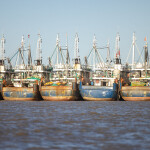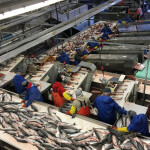A researcher who studies small-scale fishers in India and Sri Lanka has criticized the actions of the state government of Tamil Nadu, saying it should take more action to reduce illegal fishing in Sri Lankan waters.
At a talk organized by the Central Marine Fisheries Research Institute (CMFRI) in Kochi, India, Maarten Bavinck, a professor at the University of Amsterdam, the Netherlands, said a large, state-subsidized fleet of trawlers from Tamil Nadu regularly fish illegally in Sri Lankan waters in the Palk Bay.
“Trawling needs to be contained in the Palk Bay, where trawling operations across the international boundary line have not only been causing social and economic hardship for 25,000 small scale fishers and their families in Northern Sri Lanka, but high-level political tensions between India and Sri Lanka,” Bavinck said.
In his lecture, titled “Tropical Marine Fisheries Governance: The Way Forward,” Bavinck said the Tamil Nadu government ought to take action to reduce the size of its in order to resolve the conflict. However, that effort must be aligned with a broader effort to depoliticize fisheries management and move it to making decisions based primarily on science.
“In India, fisheries governance has a political dimension. Norms and priorities are not being established by science but is being debated in the public domain,” he said.
A trawler buy-back program has promise for reducing the size of the fleet, “But only if government is able to prevent the ‘leakage’ of new trawl fishing effort into [Palk] Bay,” Bavinck said.
According to Bavinck, the number of fishers continues to increase in India because of the difficulty of finding alternative employment in other sectors.
“Economic development in India is centred in the cities and in the I T sector,” he said, adding that, on the macro level, fisheries governors should” prioritize employment and the distribution of income among the fishing community, as the sector is a very important livelihood option in India. “
Bavinck encouraged India’s CMFRI and Sri Lanka’s National Aquatic Resources Research and Development Agency (NARA) to work together on joint studies and coordinated approaches towards finding science-based solutions to fisheries management problems. One such area where the two organizations could work together is in performing ecological and marine biological studies estimating the marine resources available in the Palk Bay and surveying the damage that is occurring due to intensive trawling there.
“While trawling has helped boost India’s catches and export revenues, it has also proven to be the bane of the fisheries, destroying valuable marine habitat and causing decades of intense conflict with small-scale fishers on the inshore and fishing grounds,” Bavinck said. “With marine resources largely being concentrated on the continental shelf that is within the reach of small-scale fishers, there is no reason to go for larger-scale operations in the country.”






